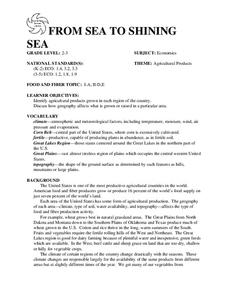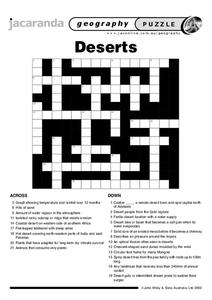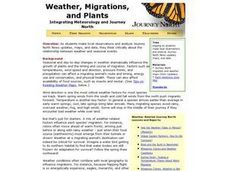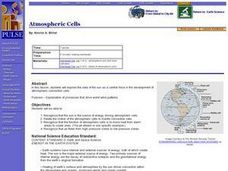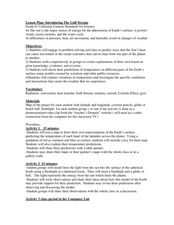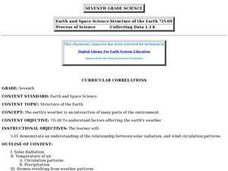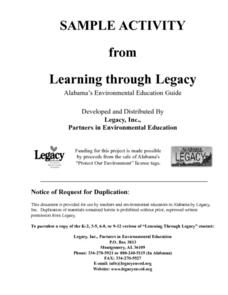Curated OER
Oxygen: What a Gas!
Eighth graders explain how oxygen reacts to other elements. They also explain why oxygen is a reactive substance, how it has weight, and how it reacts with other substances. They construct an experiment to relate their findings.
Curated OER
Weather Myths
Fourth graders relate myths to weather phenomenon. They write and illustrated a weather myth and present it to the class.
Curated OER
Hurricanes 2: Tracking Hurricanes
Students examine the role of technology in identifying and tracking hurricanes.
Curated OER
Weather Chart
Learners select at least 6 cities from around the world to keep track of their high and low temperatures over a period of time.
Curated OER
Surface Meteorological Observation System (SMOS)
Young scholars monitor local surface weather conditions for at least 30 days. They interpret the data by graphing it and detemining percentages.
Curated OER
FROM SEA TO SHINING SEA
Identify agricultural products grown in each region of the country.
Discuss how geography affects what is grown or raised in a particular area.1. Hand out a copy of the two activity sheets "Food From Sea to Shining Sea" to each student....
Curated OER
Deserts Puzzle
In this geography worksheet, students complete a crossword puzzle referring all to deserts. They identify the various types of desert land and what plants and animals can survive in these lands. Also, students identify the people who...
Curated OER
Winter and Summer Storms Scenarios
Fourth graders analyze how summer and winter storms are different. In this weather instructional activity, 4th graders construct a winter storm simulation box and a summer storm bottle and record the temperature and barometer readings....
Curated OER
Atomic Bomb Facts
In this atomic bomb study guide worksheet, students read the notes provided and add notes of their own regarding the use of the atomic bomb on Nagasaki and Hiroshima.
Curated OER
Weaving Weather Maps with the World Wide Web
Students access the Internet and use real time data from the American Meteorological Society to create a detailed weather map. They make weather predictions based on the data collected.
Curated OER
Ocean Currents Quiz
For this ocean worksheet, students complete a 13 question multiple choice on-line interactive quiz about ocean currents. Prior knowledge is assumed.
Curated OER
Quiz: Weather Terminology #1
In this science worksheet, 3rd graders focus on the weather. Students respond to ten fill in the blank questions regarding specific terminology used in weather.
Curated OER
Tornadoes
In this tornadoes learning exercise, students answer multiple choice questions about tornadoes. Students answer 6 questions about tornadoes.
Curated OER
Airplane Wings
Students examine the aerodynamics of a wing and how it generates lift. In this flight lesson students complete several experiments including how to build a paper plane and how airfoils affect performance.
Curated OER
Weather, Migrations, and Plants
Students research the effects of day-to-day weather on animal migrations, plant growth and other seasonal events. They consult maps, observe and record local conditions, keep journals and use their collected data check hypotheses.
Curated OER
Atmospheric Cells
Students recognize that the sun is the source of energy driving atmosphere cells. They relate the motion of the atmospheric cells to mantle convection cells. Students recognize that the function of atmospheric cells is to move heat from...
Curated OER
Explorit's Weather Quiz
In this weather worksheet, students complete questions to a quiz about the weather. Students complete 5 questions in the weather quiz.
Curated OER
Science Quizzes: Weather Quiz
In this weather science quiz worksheet, students respond to 20 short answer and true or false questions regarding weather and extreme weather.
Curated OER
Airplane Propeller
Students examine the different kinds of propellers and their functions. In this airplane lesson students build a hand made propeller.
Curated OER
Tree Friends
Students are introduced to tree structure and use. They identify their special tree using all senses except sight. Students identify six different internal parts within a cross section of tree trunk (bark, phloem, xylem, cambium,...
Curated OER
Introducing The Gulf Stream
Sixth graders research the average temperatures of different places on Earth. In this earth science lesson, 6th graders explain how the sun's heat cause ocean movement. They discuss how temperature change affects the weather we experience.
Curated OER
Earth's Weather
Seventh graders learn how solar radiation, latitude, and other factors affect weather. They break into six groups and are assigned a topic to research and to present their findings orally.
Curated OER
Gotta Have Energy
Middle schoolers explore energy. They discuss the types and uses of energy and research an assigned energy source. They create a "benefits versus potential environmental impacts" chart that lists energy sources and possible impacts. ...
Curated OER
Cold Front Characteristics
Students study the weather conditions before, during, and after cold front passage. Two cold front examples are provided so that comparisons can be made. They are divided in two large groups. Each group studies a different cold front case.






